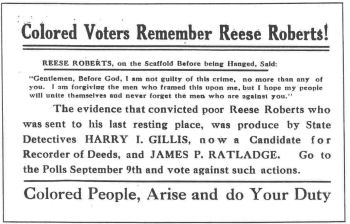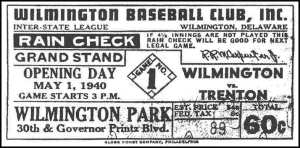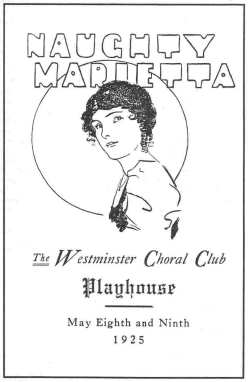Collecting Delaware Books
Paper Ephemera
Many book collectors also collect ephemera. As a book collection gets more complete and new finds are scarcer, the search for ephemera satisfies the hunting instinct while still keeping the hunter in those fields where book finds are possible. Others collect ephemera for its own sake and never become book collectors.
The noun ephemera comes from the Greek eph�mera or "upon the day," literally, "lasting one day." The British Ephemera Society defines it as "the minor transient documents of everyday life." It has come to mean any non-book printed matter intended for a short life. The word comes with quandaries attached. Like data or graffiti, not everyone agrees whether it is singular or plural. "Ephemera is" and "ephemera are" are both accepted. It can also be pronounced "ephemmera" or "epheemera."
Ephemera collecting has gained respectability in the last 15 or 20 years. There are now societies, museums, and libraries devoted to its study. Ephemera shows are often more heavily attended than antiquarian book shows.
Ephemera is divided into many categories. Not all of those categories are common in Delaware collectibles. Here are a few you will run into, however.
Tradecards
Tradecards were an early form of advertising. A roughly postcard-size piece of paper was printed with a business name, specialty, and address. These were handed out, inserted in orders, or used as stationery for orders and invoices. After the Civil War, tradecards became very colorful and were printed on card stock.
Tradecards are not common Delaware ephemera. Advertising calendars, blotters, and matchbook covers are similar to tradecards and easier to find.
Letterheads
Letterheads and billheads make a fascinating collectible and they are plentiful. Engravings of the firm's building or product are often printed with the text. The printed heading is interesting for what it says about the business. The handwritten or typed material is interesting for what it says about the way business was done. A special category of billheads is the tax bill or receipt.
Politics

Republical Primary 1922, 3"x6"
Political paper is a large field that includes handbills, posters, programs, letterheads, and tickets. There was even a political equivalent to the tradecard early in this century, a postcard-size document that could be mailed or carried around to hand out.
Labels
Labels are the most eye-catching and colorful ephemera. Local cannery labels, produce box labels, and seafood packer labels are eagerly sought and can be quite valuable. Cigar bands from the small factories in Wilmington are also collected. The small labels booksellers put inside the front cover of books are interesting. They should not be detached from the book, however.
Handbills & Posters
Handbills and Posters are an early form of advertising that is still with us. Evald Rink in his Printing in Delaware 1761-1800, Wilminton, 1969, lists broadsides as early 1761. Today we have a flood of local posters from book and antiques show posters designed by local artists to those pizza ads stuck under your car's windshield wiper in a parking lot. Old theater and vaudeville house posters were often crudely made by local printers. Handbills for auction sales are particularly interesting collectibles.
Funeralia
Funeralia is not a collectible for everyone, however many printed items in this category are beautifully produced. Memorial cards, funeral service programs, undertakers' announcements, printed fans, and printed armbands or ribbon badges are all ephemera. The ceremonies connected with death in 19th century America were folk rites and are accurately reflected in the printed documents.
Tickets

season of the first incarnation of the
Wilmington Blue Rocks baseball team in 1940
Tickets for local theaters, circuses, amusement parks, sports events, railroads, and steamship companies are popular with collectors. They often show up tucked in unlikely places.
Shown to the right is a rain check for the Wilmington Blue Rocks professional baseball team in 1940. The team had not been named yet The rain check has a fine red hatching in the background to prevent counterfeiting. This collectible was bought for $75 about the time the Blue Rocks name reappeared in 1993. It would be worth far more today.
Bank Stationery
Bank stationery is easy to find. Delaware has a rich banking history, and a collection of blank checks from throughout the state or a single county would make an interesting display. Bank notes and local corporate stock certificates are also collected.
Legal Papers
Deeds, titles, mortgages, wills, and indentures do not quite fit the definition of ephemera. They were handwritten on excellent paper and meant to last for years. However, they are an interesting collectible and often reasonably priced. Always hold these documents to the light and check them for a papermaker's watermark. It is not unusual, for example, to find a watermark saying "JG&ColBrandywine" on 18th century Sussex County wills, showing the extent of trading area of Joshua Gilpin, Delaware's pioneer papermaker.
Programs & Playbills
Programs for church services, graduations, theater performances, lectures, concerts, and dedications are easy to find.
Playbills from local theaters, drama groups, and schools are an interesting addition to a Delaware ephemera collection. These booklets, given to the audience, often include a list of the players, a synopsis of the play, recognition of sponsors, advertisements, and previews of coming plays.
Delaware has a rich tradition of both professional and amateur theater. The Playhouse in Wilmington has been bringing major dramatic and musical productions to the state since early in the 20th century. The Grand Opera House, though less oriented to plays, has been doing the same for more than a decade.

Less slick but just as interesting because of their home-grown nature are the offerings of such groups as the Wilmington Drama League, the University Drama Group, the Players Gild of Arden, Brecks Mill on the Brandywine, the Delaware Theater, and dozens of others throughout the state. Then there are the high school senior plays and school operettas. There is no shortage of playbills to collect, but finding them may require persistence.
Shown to the right is the cover of a playbill for the Westminster Choral Clubs 1925 production of Victor Herberts "Naughty Marietta" at the Playhouse. The club was apparently founded by young women at Westminster Presbyterian Church in 1917. They asked Frederick Wyatt to be director and expanded to a mixed choir singing religious music. Activity was interrupted by Wyatts service during WW I. When it resumed, emphasis changed, and the group successfully staged operettas by Gilbert and Sullivan and Victor Herbert at the Playhouse.
This playbill lists the cast as well as hundreds of choir members and associate members of the society. All the usual du Pont names are included.
There are local ads for Packard automobiles, Fraims Dairy, Speakman plumbing fixtures, the Greenwood Book Shop, Govatos Candy, grocers, beauticians, furniture dealers, morticians, florists, banks, druggists, hardware stores, coal companies, photo finishers, jewelers, silversmiths, cigar dealers, corsetieres, house painters, and restaurants.
Postcards & Bookplates
These are collecting fields of their own and are covered in detail in other articles in the print newsletter and on this Web site. Click to see pages on postcards or bookplates.
Other
Lots more kinds of paper are collectible. There are no limits to the field. Report cards, bank books, printed bags or wrapping paper, sample ballots, business licenses, and school autograph books are all possibilities.
So where do you find Delaware ephemera? Start with the dealers who carry Delaware books. Flea markets and auctions are good sources. There are major national ephemera shows, but a number of Delaware dealers exhibit at Paper Americana the last Saturday in January at Singerly Fire Company in Elkton, Md. A similar show may be organized for the fall of 1993 in Delaware. Finally, check the odd lot boxes at yard sales. Great ephemera is often put out as junk.